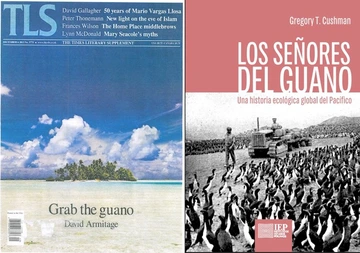Gregory Cushman

Chávez 328
Research Areas
Gregory T. Cushman is a global environmental historian specializing on the Andean and Pacific Worlds. He joined the University of Arizona history faculty in fall 2022. He teaches courses on Latin America, environmental history, the tropical world, and HIST 222 Poop: A Global History. Much of his teaching and scholarship has involved interdisciplinary collaborations with natural and social scientists, and he is a founding member of the Arizona Environmental Humanities Collaborative. PhD students he has supervised received tenure-track positions at Creighton University, Universidad Autónoma de San Luis Potosí, University of Rhode Island, and Virginia Military Institute.

His 2013 book Guano and the Opening of the Pacific World: A Global Environmental History (Cambridge University Press) is one of the first studies to examine the environmental and cultural history of the modern world from the perspective of the whole Pacific Basin. It was featured in the Times Literary Supplement, on NPR, and won four international awards, including the inaugural Jerry Bentley Prize in World History from the American Historical Association. The Instituto de Estudios Peruanos published a revised and expanded Spanish translation in 2018, with a Chinese edition forthcoming.
He is currently finishing a book on Debating Ecological Imperialism: Environmental Change in Global and Pacific World History. It combines explorations of key debates in global environmental history from the late Pleistocene to the Anthropocene (overkill, civilizational collapse, the Columbian exchange and ecological imperialism, and the Anthropocene debate) with archivally based case studies of ancient and modern Rapa Nui, Tahiti, Hawai‘i, the colonial Andes, and the Long Great Acceleration (ca. 1700-1980). Indigenous peoples’ engagements with the natural world are a major focus of his scholarship, particularly their resistance and resilience to the forces of ecological imperialism and their changing relationships with marine and nighttime environments. He has published several articles on climate and weather history and the history of climate science, focused on La Niña, El Niño, tropical cyclones, and the Global Little Ice Age (ca. 1570-1720). An ongoing research project considers the life, queer loves, and far-reaching historical influence of Prussian scientist Alexander von Humboldt (1769-1859) and his many followers, especially in Latin America and the Caribbean. The American Meteorological Society, Fulbright program, National Science Foundation, Rachel Carson Center, and an Andrew Carnegie Fellowship have provided major grant support for these initiatives.
Selected publications
- “Ecologies of Resilience: The Many Colonizations of Rapa Nui (Easter Island), c. 1200-Present.” With Trisha Jackson and Johannes J. Feddema. American Historical Review 129, no. 4 (Dec. 2024): 1501-1541. Special issue on Histories of Resilience. Winner of the Abbott-Johnson Prize for best article in Pacific World history.
- “Guano.” In New World Objects of Knowledge: A Cabinet of Curiosities, ed. Mark Thurner and Juan Pimentel, 251-258. London: University of London Press, 2021.
- “The Phosphorus Apparatus.” With Zachary Caple. Technosphere Magazine (Berlin: Haus der Kulturen der Welt, 2016).
- “The Environmental Contexts of Guaman Poma: Interethnic Conflict over Forest Resources and Place in Huamanga (Peru), 1540-1600.” In Unlocking the Doors to the Worlds of Guaman Poma and his Nueva Corónica, ed. Rolena Adorno and Ivan Boserup, 87-140. Copenhagen: Museum Tusculanum Press, 2015.
- “Humboldtian Science, Creole Meteorology, and the Discovery of Human-Caused Climate Change in Northern South America.” Osiris 26 (2011): 19-44.

